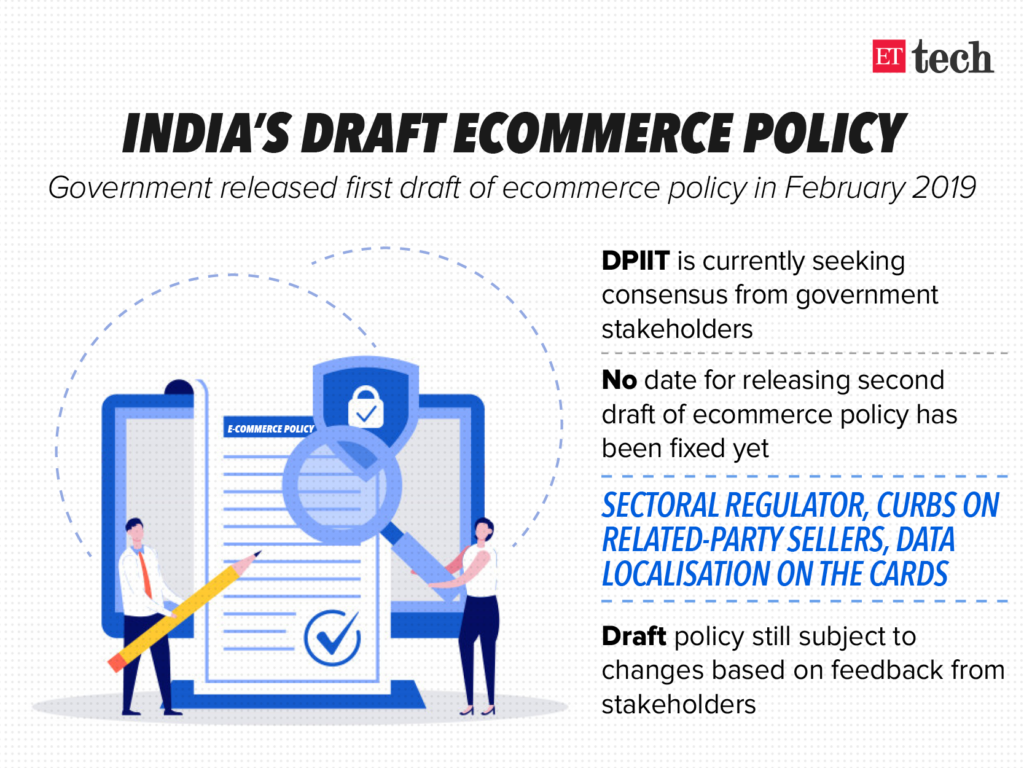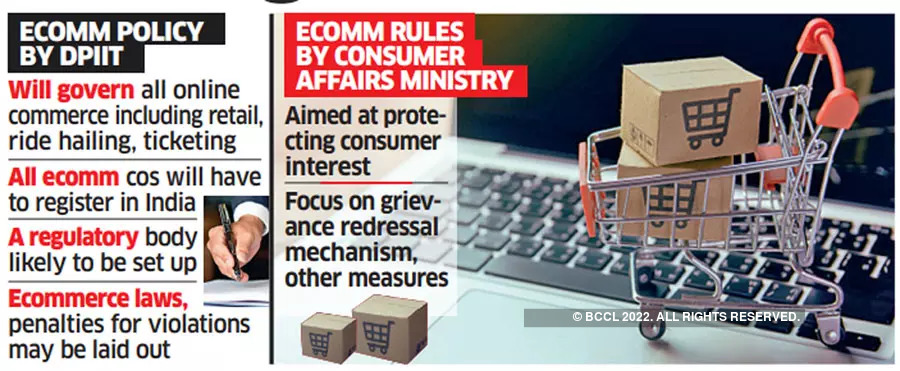The Indian government is gearing up to release a revised draft eCommerce policy. Here’s a quick run-through of the new laws that the revised draft could bring in and what it would mean for your small online business.
3 laws that are likely to be applicable as part of the draft eCommerce policy
1. The DPIIT will govern most online marketplaces
The Department for Promotion of Industry and Internal Trade (DPIIT) has had multiple meetings with corporate and government stakeholders to increase regulation in the eCommerce space.
They plan to:
- Tighten norms for online retailers
- Ensure rules and regulations like FDI guidelines are not flouted
- Establishing fair pricing mechanisms
- Prevent misuse of data
- Prevent monopoly by any company
More intensive governance of marketplaces will help small online businesses with independent online stores be more relaxed against unfair competition.

2. All eCommerce companies will need to have an Indian registration
The primary objective of the government is to ensure eCommerce is a safe space. Mandatory registrations with a government authority will help protect the interests of consumers and local small online sellers.
Once your business is registered as an Indian business, it is mandatory to get your business GST registered so that your eCommerce entity is seen as a tax-paying entity.
You could be entitled to an exemption if you earn less than ₹40 lakh annually and if you are an independent online seller.
However, if you intend to sell on a marketplace, GST registration is compulsory for you. You will be liable to pay GST irrespective of what you earn.
The new norm of mandatory registrations for eCommerce businesses is mainly due to fears of:
- Non-compliance by larger players
- Tax evasion
An Indian registration will also help small local online sellers as they would become eligible for benefits provided by the Indian government.
3. New laws on consumer protection will be launched
The DPIIT is concerned about unfair practices by marketplaces that harm small sellers and consumers. They want to discourage practices like deep discounting, biased use of algorithms, unfair competition and sale of prohibited items.
Accordingly, the new laws for consumer protection will have clear stipulations so that there is
- 100% transparency
- Adequate grievance redressal system

How do the eCommerce draft policies apply to your DTC brand
If you already sell/distribute on a marketplace, you may need to stay aware of these laws. Here are a few ways you can prepare your DTC eCommerce business for the new laws.
1. Register your eCommerce company
It’s good to have your DTC brand/company GST registered so that you can utilise the benefits that the government provides for Indian sellers.
On Instamojo, we want our customers to have a smoother, quicker and hassle-free GST registration process. This is why we partnered with LegalWiz.in so that Instamojo users can avail GST registration services at a discounted rate. GST registration offers legal recognition as a supplier with a one-time registration. It is an integral part of the business.
Use the app provided by LegalWiz.in on our portal to ensure your business is safe from compliance issues.
2. Use a trustworthy payment gateway so everything is transparent
It is important to realise that your online payments are not just restricted to a customer, but vendors too. A payment gateway for DTC brands should comply with a bank-grade security level, like Payment Card Industry Data Security Standards (PCI-DSS) and provide a secure encrypted environment for payments. This ensures transparency and prevents hidden charges.
Also, for heightened safety and fraud prevention, opt for fraud detection and prevention mechanisms. Build these features into the gateway to avoid chargebacks and other issues.
Instamojo is PCI-DSS compliant, and your transactions are 100% safe and secure. There are no hidden charges, and there is complete transparency on every transaction. Choose safe online payments with Instamojo.
3. Have a fool-proof refund, returns, and customer service policy hosted on your website
If you have your own eCommerce website, it is crucial that you have a clearly outlined returns and refunds policy on your website. Studies report that 92% of online shoppers become repeat customers if the return and refund process is easy and transparent.
A website that has clear policies for customer service also helps in building trust. Today, consumers are more concerned with how and where there products are coming from. As DTC brands and independent sellers grow, clearly stated information on your website will become super important to build long-lasting customer relationships.
Realise your entrepreneurial dreams with Instamojo
This is a golden time for the Indian eCommerce space. If you have always dreamt of having your own online store, now is the time to fulfil these dreams. The government, industry bodies and consumer sentiment is all on your side. The Indian consumer is more aware of what they are buying and their first priority is going to be supporting an Indian homegrown small brand.
Ready to move away from a marketplace and sell on your own website? Get started on Instamojo!

